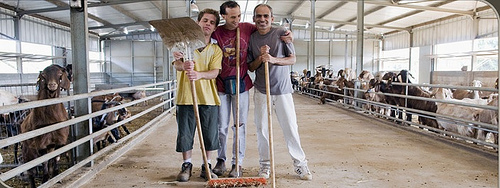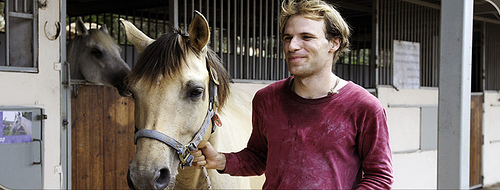
(Working on the organic goat farm at Kishorit, the largest organic goat farm in Israel that sells its “fair trade” milk to Harduf, the largest organic food supplier in Israel.)
People born with mental deficiencies, or those afflicted later in life, are usually handed the short end of the stick. Facilities to accommodate needs and to help one cope in society are improving, but they fail to give those in need the advantages that “normal” people just take for granted. But not at Kishorit, a new village built on the ruins of a decaying kibbutz, in Israel.
A new model for treating the mentally disabled based on the Israeli commune idea has emerged over the last decade from the ruins of a crumbling kibbutz.
Called Kishorit, the village in northern Israel has become a utopia for about 150 people with varying degrees of mental handicap, who have all found a home for life.
Some have autism, Asperger’s, or schizophrenia, but as much as they can, they are all steering their own careers, social time, family life, and destiny. They don’t focus on what disability they have, but on what they can do.
Members run and operate a TV station, and create films, they’ve built the largest organic goat farm in Israel, possibly the entire Middle East; they plant, tend to and eat food from their organic garden, and are developing lines of toys, which last year were sold to Baby Gap.
Choosing to live with a mate, a friend or alone, the wildly popular community where residents live, eat, learn, work and play has become so popular that the directors no longer keep a waiting list. Employing and accepting all members of the Israeli community, you can find Israeli Jews, Arabs and Druze working on and enjoying the pastoral setting.

Tipper Gore, the wife of Al Gore, came to Israel last summer with her husband, and she made a point to stop in at Kishorit, just miles from the Lebanese border. As a clinical psychologist Gore was impressed by what she saw: “This is a good model for people to know about so they can make it in other countries. In the United States, we’d love to have places like this,” she said.
How to do things right on many levels
A personal friend of Dita Kohl-Roman, the director of resource development at Kishorit, Kohl-Roman said she wouldn’t have “dragged” Gore all the way to Kishorit if it weren’t something exceptional to see. “It is not about arms or high-tech,” says Kohl-Roman, who left a job working in the Israeli Foreign Affairs office to promote Kishorit.
When she first saw the community, “It brought back the color to my Israeli cheeks, because something here is done right,” she tells ISRAEL21c. “The place resonates with so many aspects of how to do things right [in society]. It’s quite fantastic.”
Her brother, who has Asperger’s, is now a happy member of Kishorit.
Younger members attend the Ziv Kishorit Democratic High School, the only school of its kind serving Jewish and Arab adolescents with mental health issues in Israel.
Recycling in their homes is encouraged, and a recycling plant that produces paper bags from recycled newspapers is just one of the many “green” efforts the collective is working on. Developing a new line of toys, possibly eco-friendly, to be marketed and distributed in the United States and Canada is another source of income.
Kishorit also runs a large organic egg farm that produces 250,000 organic eggs per year for an eager market, generating extra income for Kishorit. They have a dog kennel that produces prizewinning dogs, and horse stables for providing animal therapy to the residents and day patients. The list goes on.
From organic goats to boutique wine
Noam Dichek, 30, was one of the first to join Kishorit. He arrived at the kibbutz 12 years ago. “When I first came there wasn’t anything,” he tells ISRAEL21c. “I started the first newspaper we have, and I built the goat farm. We have about 3,000 organic goats.”
Over the years he helped the kibbutz select the goats they would raise, and now looks forward to making organic wine, a boutique wine, that Noam says the kibbutz will produce in about four years when the vines can be harvested. “People from the community will be making the wine,” he says.
Now working in communications, but still living on the kibbutz, Noam takes on creative jobs like making movies, and writing articles about his community in a monthly newsletter. Being there also helped him fulfill a lifelong dream of publishing a book, something he’d been working on since he was five years old. Called My Soulmate, the Hebrew book is based on a diary that Noam kept over the years.
It was Noam’s family who pushed the government to include the kibbutz in its subsidy basket, and today members’ disability subsidies go to maintaining their daily lives, while additional income from the factories and farms helps them build new programs and infrastructure.
The government of Israel also recently agreed to give funding to build new infrastructure for an Arab kibbutz, built along the same concepts, to serve the distinct language and community needs of Israel’s Arab population.
While Noam is a busy and active member of the kibbutz, not everyone in the community has the ability to work, he explains. “Most of the members are working in plastics or in toys, or with the goats or horses. But not everyone works. My best friend sleeps,” he says.
A sense of community
Noam also makes a point to mention that his social worker is from the Druze community and that he has Arab friends from throughout the Galilee region. This is exceptional considering in most cases the Arab and Jewish communities in Israel tend to remain distinct and separate.
Some parents enjoy the Kishorit community so much that they are planning to build their own community for staff and family nearby.
Kishorit was founded in 1997 by Shuki Levinger a social worker by training, and Yael Shiloh, an artist. Shiloh had married a man with a developmentally disabled son, a patient of Levinger.
Remembering the warm community she’d been brought up in at Kibbutz Kfar Szold in Israel, Shiloh wanted to build a similar environment for people like her husband’s son, with the sense of community they did not have.
“There are a few angles here,” says Kohl-Roman. “Everything comes out from this foundation of special needs but [this community] is much bigger than special needs. Through them we are going to [issues of] sustainability, ecology and co-existence with our neighbors. The people who established Kishorit did it because they wanted them to live like you and I.”
A home for life is a comfort and promise
Kohl-Roman believes that Kishorit is a model community that even the most able-bodied could dream of living in. “People with special needs are here to give us some kind of a lesson: we need to pay back and we need to give them more than we are giving ourselves,” she says.
As a home for life, including old age, which is a very comforting promise to the parents of the members, Kishorit is now building a facility to accommodate seniors. “A very important basic here is the community,” says Kohl-Roman. “Every member is doing what they can. They will choose their work and will move to different professions until they find something that fits.
“At every point in their life they will get what they need. The community here is the sum bigger than its parts. You belong in a place you are proud of, you can find what you like to do,” she explains.
Recognizing a connection between the environment’s health and the increase of disorders such as autism in children, the founders of Kishorit believe it’s important that the members are exposed to the highest quality food, aesthetics and environment.
Building with, on and from the local environment, Kohl-Roman expects this special community for special people will be copied widely in the United States and around the world.
More intentional eco-communities in Israel:
Nitsana’s an Eco-Village That Practices What It Preaches
Eco-friendly Town Nurit In The Works In The Golboa
Eco-village Kramim, A Ray of Light In the Desert
The Kibbutz Movement, An Organic Revival
(This story is reprinted with permission by ISRAEL21c www.israel21c.org.)
::Kishorit




Dear Sir/Madam:
Greetings from a complete stranger but who heard the impressive story about Yochanan Bayit last Tuesday on National Public Radio.
I wanted to share with you just a little information about Gould Farm the US’ oldest psychiatric rehabilitation facility in western Massachusetts. I grew up on Gould Farm and now sit on its Board of Directors. Unlike YB, however, Gould Farm addresses the needs of those dealing with mental illnes rather than developmental disorders.
Your endeavors and those of Gould Farm appear to have mutual approaches to therapy, especially the expectation of work which has long distinguished Gould Farm and has impressed scholars of communal experiments like Henrik F. Infied. .
Please find a link to a story by Oliver Sacks from a September edition of New York Review of Books which mentions Gould Farm at the end. I’m having difficulties sending a link about Gould Farm but s simple “Google” search will reveal the appropriate links.
Best wishes in all your endeavors.
Sincerely,
Steve Smith
The Lost Virtues of the Asylum -The New York Review of Books.mht”; size=80839;creation-date=”Thu, 17 Sep 2009 13:26:29 GMT”;modification-date=”Thu, 17 Sep 2009 13:26:29 GMT 78.9 kb